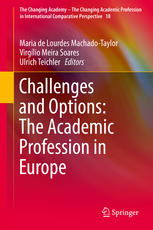

Most ebook files are in PDF format, so you can easily read them using various software such as Foxit Reader or directly on the Google Chrome browser.
Some ebook files are released by publishers in other formats such as .awz, .mobi, .epub, .fb2, etc. You may need to install specific software to read these formats on mobile/PC, such as Calibre.
Please read the tutorial at this link: https://ebookbell.com/faq
We offer FREE conversion to the popular formats you request; however, this may take some time. Therefore, right after payment, please email us, and we will try to provide the service as quickly as possible.
For some exceptional file formats or broken links (if any), please refrain from opening any disputes. Instead, email us first, and we will try to assist within a maximum of 6 hours.
EbookBell Team

5.0
40 reviewsThis volume explores the various issues that have an impact on the academic career of professionals in European higher education. Higher Education Institutions (HEIs) are currently subject to profound uncertainties and are more challenged than ever on quality issues, both with regard to their conceptual nature and in the extension and amendment of their mission. Divided into three parts, the first part of the book deals with the challenges and issues in higher education academic careers. It addresses such topics as the influence of European policies and changes, the cultural differences in the preferences of academics for teaching or research, the increasing inequality in working conditions for academics, and the changing nature of academic strategy in the transformational world of higher education with its implications for academic structures, work and careers. The second part of the book analyses the findings of a national study on satisfaction of academics in Portuguese higher education, carried out at the Centre for Research on Higher Education Policies (CIPES). The third part offers a comparative analysis of a number of national European case studies, focusing on the changing relevance of and increasing expectations around academic careers. The concluding chapter discusses whether the academic profession is merely an artificial term that has to do with a heterogeneous range of occupations, or if there are important common elements of the academic profession across European Higher Education systems.